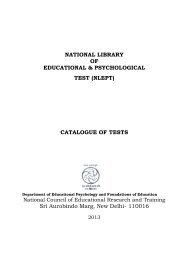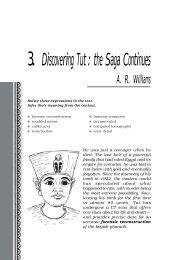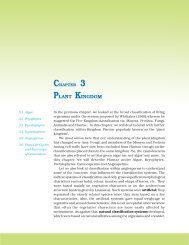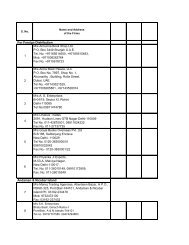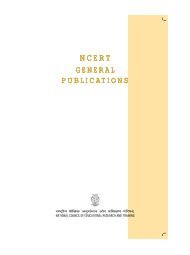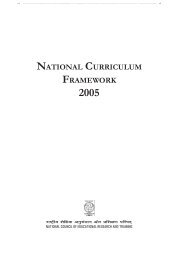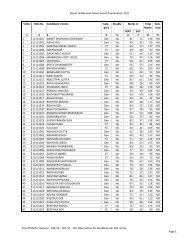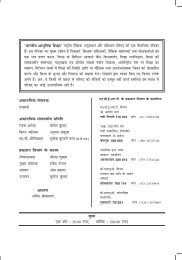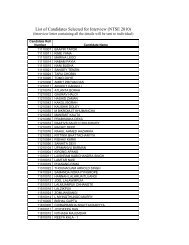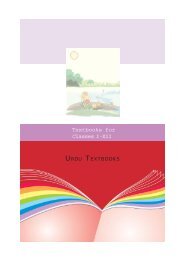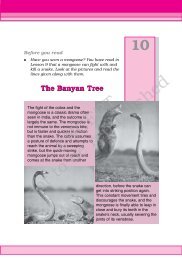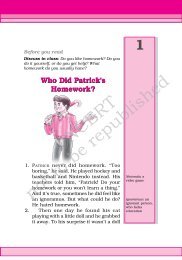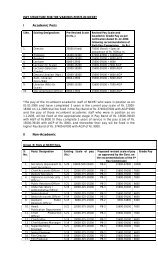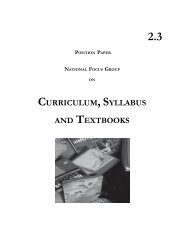Annual Report - National Council Of Educational Research And ...
Annual Report - National Council Of Educational Research And ...
Annual Report - National Council Of Educational Research And ...
Create successful ePaper yourself
Turn your PDF publications into a flip-book with our unique Google optimized e-Paper software.
textbooks for Classes XI and XII for History of Art; the theory part of Visual Arts.<br />
The translation of Class XI textbooks and its vetting has also been done during<br />
the workshop. The Class XII textbooks of Graphic Design and History of Art, will<br />
be completed by next session.<br />
Development of Teachers’ Manual for Teaching Theatre in Upper Primary<br />
Classes<br />
The teachers’ manual was planned with the objective of guiding the teachers for<br />
theatre in specific, integration of arts education in general and evaluation of the<br />
child in the process of learning theatre or through theatre. Since NCF-2005<br />
recommends no textbooks till the secondary stage, the manual will benefit the<br />
teachers. It is being developed by a team of T.I. Educator experts who are artists<br />
and practising theatre artists.<br />
The chapters in the manual include; objectives of theatre education, role of a<br />
teacher, different concepts of integration, basic elements of theatre introduced<br />
through various types of activities, different methods of evaluation having various<br />
analytical processes. A feedback of the manual was taken from teachers of different<br />
government and non-government schools to ensure the feasibility factor. The<br />
response was overwhelming and suggestions by teachers were included to<br />
enhance the quality of the manual. An audio-video CD will also be developed in<br />
the next phase, based on activities given in the manual while they are practised<br />
by teachers in different schools.<br />
Preparation of supplementary material in print and audio-visual on<br />
Musical Instruments of India<br />
India is a vast country having diverse cultural activities, which are often unknown<br />
in its different parts. This material will help learners including teachers, teacher<br />
educators, students etc. living in different parts of the country in enhancing their<br />
knowledge of Indian musical heritage. India has a wide variety of musical<br />
instruments— aerophones, idiophones, chordophones and membranophones<br />
which have evolved since the ancient times. Nature has given raw materials like<br />
bamboo, wood, metal, clay etc. in abundance, which were used for developing<br />
musical instruments by the creative and innovative methods by people living in<br />
different parts of the country. This rich and diverse heritage is being showcased<br />
in a supplementary reading material with photographs and description of about<br />
a hundred musical instruments used for various types of music— classical and<br />
folk, dance, drama, which are a part of everyday life and have evolved on design<br />
and sounds. Examples of instrument making in each category have also been<br />
documented. In the next phase this will also be developed in the form of a multimedia<br />
CD.<br />
EXTENSION<br />
Resource Centre Events on Arts and Crafts<br />
The objective of creating a resource centre of arts and crafts in the department<br />
and conducting activities to explore, experience and understand arts and crafts<br />
and its role in education.<br />
An advisory meeting consisting of educationists, artists, policy makers and<br />
planners was followed by two major workshops, which were part of the year long<br />
Golden Jubilee celebrations of NCERT, from 12 to 14 January 2011 with special<br />
<strong>Annual</strong> <strong>Report</strong> 2010-11<br />
<strong>Annual</strong> <strong>Report</strong> 2010-11<br />
<strong>Annual</strong> <strong>Report</strong> 2010-11<br />
81



